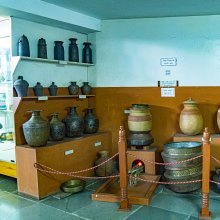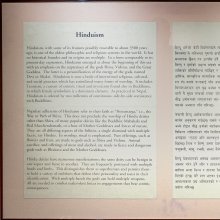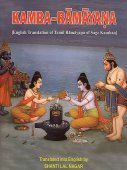Wine: 3 definitions
Introduction:
Wine means something in Hinduism, Sanskrit, the history of ancient India. If you want to know the exact meaning, history, etymology or English translation of this term then check out the descriptions on this page. Add your comment or reference to a book if you want to contribute to this summary article.
Images (photo gallery)
In Hinduism
Yoga (school of philosophy)
Source: ORA: Amanaska (king of all yogas): A Critical Edition and Annotated Translation by Jason BirchWine can summoned, as part of the powers granted to one following certain Yoga practices, according to the Brahmayāmala-tantra (or Picumata), an early 7th century Śaiva text consisting of twelve-thousand verses.—Accordingly, [while describing a haṭha-sādhana (foreceful practice)]: “[When the Sādhaka] remains [in the hole] for up to one day, he is freed from all sins. By the second day he [gains] the desired Siddhi [arising from] the mantra. By day three, he accomplishes the rite of [magically] summoning wine (madya). [...]”

Yoga is originally considered a branch of Hindu philosophy (astika), but both ancient and modern Yoga combine the physical, mental and spiritual. Yoga teaches various physical techniques also known as āsanas (postures), used for various purposes (eg., meditation, contemplation, relaxation).
Shaktism (Shakta philosophy)
Source: ORA: Amanaska (king of all yogas): (shaktism)Wine is denoted by the Sanskrit term Madya, according to the 17th century Kaulagajamardana (“crushing the Kaula elephant”) authored by Kāśīnātha or Kṛṣṇānandācala.—Accordingly, [as Īśvara said to Pārvatī]: “Listen, O Pārvatī, I shall give a critique of the Pāṣaṇḍas. Knowing this, a wise man is not defeated by them. [...] He who wears ash from the cremation ground and delights in wine (madya) and flesh; he who performs such [rites] as bathing and the junctures for [mere] worldly rewards; and he who is the vilest [of them all,] having become a hater of Viṣṇu, destroys everything; [all of them] are called Pāṣaṇḍas. [Now,] my dear, hear about the Kāpālika. [...]”

Shakta (शाक्त, śākta) or Shaktism (śāktism) represents a tradition of Hinduism where the Goddess (Devi) is revered and worshipped. Shakta literature includes a range of scriptures, including various Agamas and Tantras, although its roots may be traced back to the Vedas.
India history and geography
Source: Singhi Jain Series: Ratnaprabha-suri’s Kuvalayamala-katha (history)Wine was collected and put on the drinking tables, as part of the tasks performed to beautify the Sleeping chamber (of young ladies) in Ancient India, as depicted in the Kathās (narrative poems) such as Uddyotanasūri in his 8th-century Kuvalayamālā (a Prakrit Campū, similar to Kāvya poetry).—The Kuvalayamala (779 A.D.) is full of cultural material which gains in value because of the firm date of its composition. [...] Page 83.3-9: Here is the description of the house or the sleeping chambers of young ladies which were beautified for the reception of their husbands. The select items in this list are as follows: [e.g., collecting wine on the drinking tables;] [...]

The history of India traces the identification of countries, villages, towns and other regions of India, as well as mythology, zoology, royal dynasties, rulers, tribes, local festivities and traditions and regional languages. Ancient India enjoyed religious freedom and encourages the path of Dharma, a concept common to Buddhism, Hinduism, and Jainism.
See also (Relevant definitions)
Starts with: Wine grape, Wine grass, Wine palm, Wine-plant, Wineberry, Winecup clarkia.
Ends with: Mtwine.
Full-text (+748): Madya, Madira, Varuni, Sura, Madhu, Kattoya, Katamalini, Pakvarasa, Asava, Hala, Madhumada, Madyapi, Klaitakika, Surabhajana, Gandhavat, Patala, Kadambari, Cashaka, Sthanaka, Oshadhimadya.
Relevant text
Search found 192 books and stories containing Wine; (plurals include: Wines). You can also click to the full overview containing English textual excerpts. Below are direct links for the most relevant articles:
Charaka Samhita (English translation) (by Shree Gulabkunverba Ayurvedic Society)
Chapter 27g - The group of Wines (Madya) < [Sutrasthana (Sutra Sthana) — General Principles]
Chapter 27 - Diet and Dietetics (Annapana-vidhi) < [Sutrasthana (Sutra Sthana) — General Principles]
Chapter 12a - The Pharmaceutics of the Physic nut [danti-dravanti-kalpa] < [Kalpasthana (Kalpa Sthana) — Section on Pharmaceutics]
Manusmriti with the Commentary of Medhatithi (by Ganganatha Jha)
Verse 11.92 < [Section VIII - Expiation of drinking Wine (surā)]
Verse 11.146 < [Section XVII - Expiation for the Sin of taking Forbidden Food]
Verse 4.216 < [Section XIV - Other Duties]
Mahabharata (English) (by Kisari Mohan Ganguli)
Amarakoshodghatana of Kshirasvamin (study) (by A. Yamuna Devi)
Daily Life (4): Household Articles < [Chapter 3 - Social Aspects]
Daily Life (1): Food and Drinks < [Chapter 3 - Social Aspects]
Religion, Religious Myths and Legends (Introduction) < [Chapter 4 - Cultural Aspects]
History of Indian Medicine (and Ayurveda) (by Shree Gulabkunverba Ayurvedic Society)
Chapter 4 - The Use of Wine < [Part 4 - Some Aspects of Life in Caraka’s Times]
Chapter 10 - Woman in Caraka’s Times < [Part 4 - Some Aspects of Life in Caraka’s Times]
Chapter 22 - Pharmacy < [Part 2-3 - Medical Institutions in Ancient India]
Ramayana of Valmiki (by Hari Prasad Shastri)
Chapter 11 - Description of the Banqueting Hall < [Book 5 - Sundara-kanda]
Chapter 9 - Hanuman searches the Harem < [Book 5 - Sundara-kanda]
Chapter 6 - Hanuman explores Ravana’s Palace < [Book 5 - Sundara-kanda]
Related products








